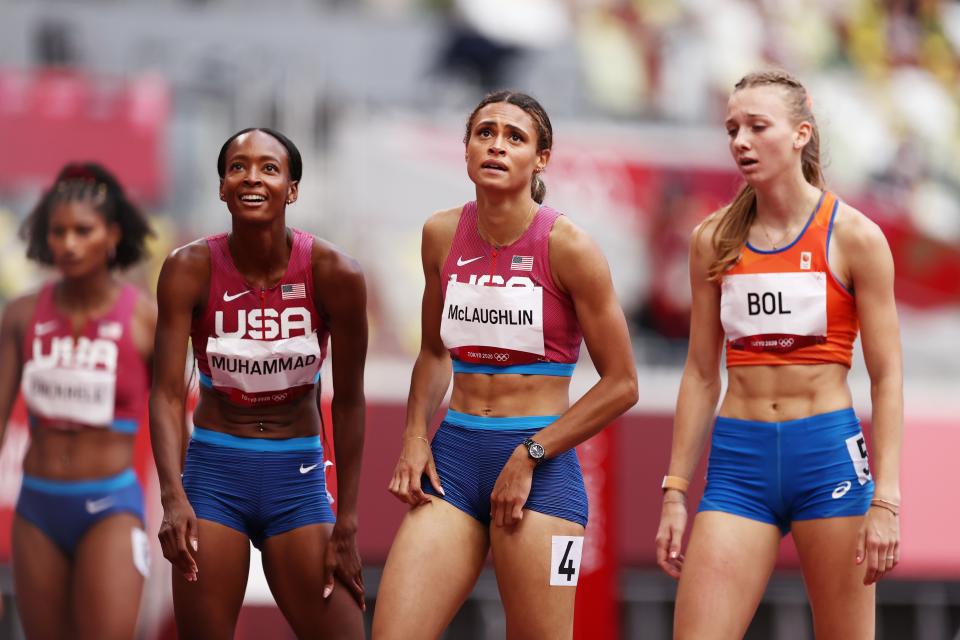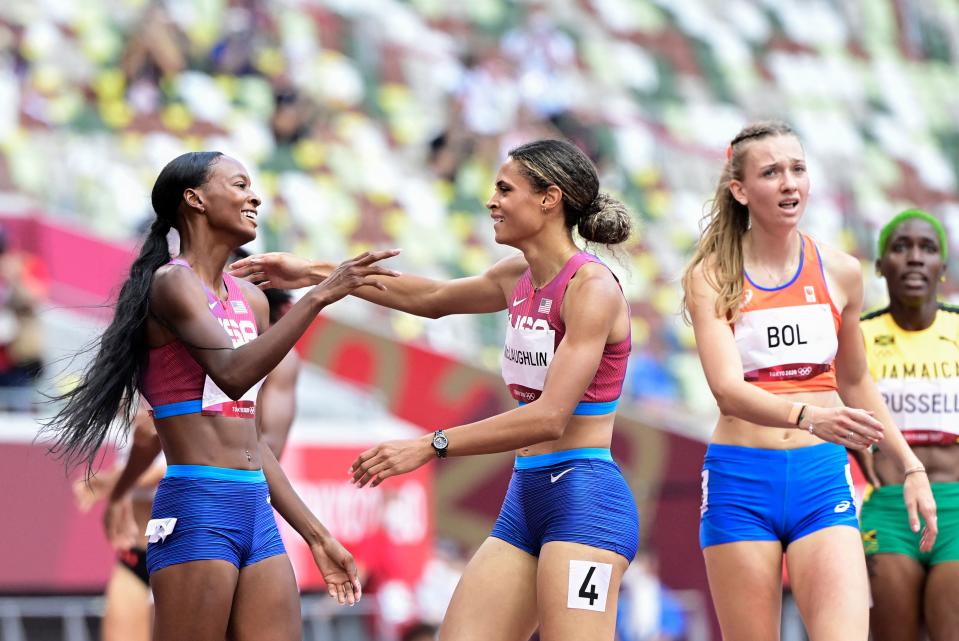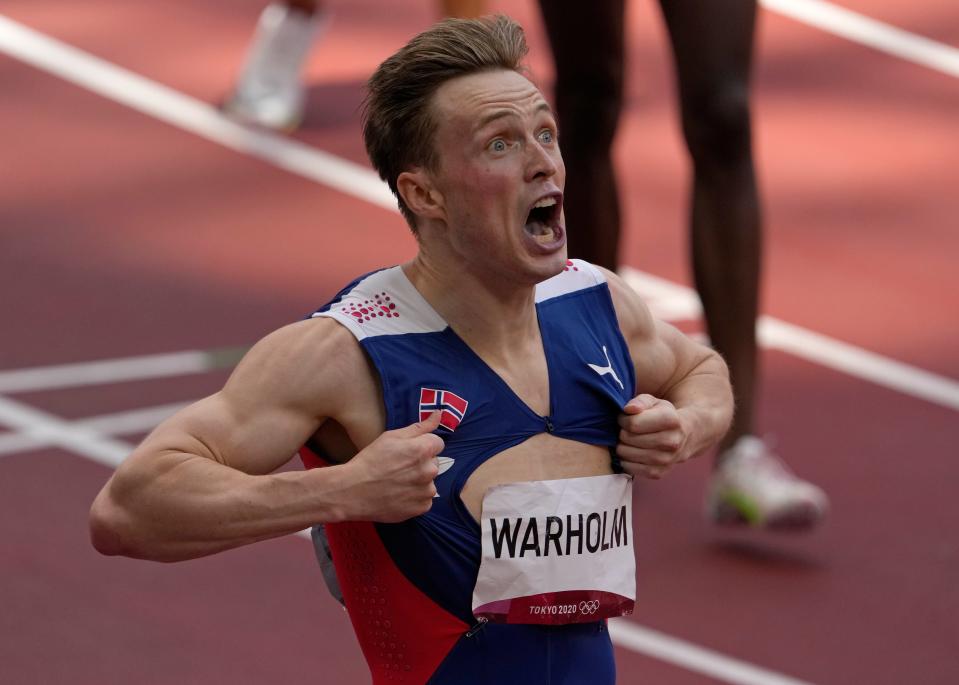Sydney McLaughlin follows Karsten Warholm to show ‘limitless’ potential as 400m hurdles steals show again
Another 400m hurdle race, another record smashed.
Sydney McLaughlin set a new world standard with a stunning run of 51.46 to claim gold in the women’s event at Tokyo 2020. Just 24 hours after Norway’s Karsten Warholm took almost a second off his world record, the American took close to half-a-second off her’s, which stood at 51.90.
The similarities between the men’s and the women’s race continued further down. Team USA’s Dalilah Muhammad (51.58) finished second and ran inside the previous record, as did the men’s silver medalist Rai Benjamin.
Like Brazil’s Alison dos Santos on Tuesday, Femke Bol of the Netherlands now has the area record, for Europe rather than South America. As it happens, this 52.03 is sharper than the previous world record before McLaughlin took it under 52 at a meet at a US Tracks Trial in at the end of a June.
The 400m hurdles have always existed in this half-way house whereby the jeopardy of the hurdles is countered by the knackered bodies that end up flopping over the line. And yet with the 100m not quite the blue ticket even that it was, more on the men’s side than the women’s, the full-lap hurdles has snuck through and into the hearts of even the most casual of athletics fans.
"It's not one of the hot events that people usually want to watch a whole lot, but we definitely made it something very interesting,” said McLaughlin.
“I have been part of that journey from being the event no one watched to the event that everybody wants to watch and being the main event."
You could argue this was the better of the two races. Unlike the men’s, the order the three women would finish was still up in the air as they leapt over that final hurdle. Muhammad landed first, then McLaughlin followed closely by Bol. McLaughlin, though, made the most of the final dart home.
“We've practised the last 40 metres so many times in practice,” said McLaughlin. “It was nothing unfamiliar for me. I just knew I had to go and give it everything I had and dip at the line.”

She was helped, somewhat, by Muhammad’s sole mistake - certainly the only one she was willing to divulge in the mixed zone. The pacy track had her bounding between each hurdle, seemingly with ever-increasing speed. So as she approached the 10th and final hurdle, she had a choice she didn’t usually have, and the shortest time to make it.
“ I could have gone right or left leg,” she said, with a rueful smile. “And I chose to go right leg. I had to shorten my strides but that is just how it goes.”
The same question was asked of her as it was of Benjamin: if someone had put it to you at the start of these Games that you’d run so fast and not win, what would you do?
Benjamin had himself on the first flight home. Muhammad, though, was exactly where she wanted to be.
“I’m truly proud of second place and yes to come home with silver after breaking a world record. It could be mixed emotions, but right now I truly don't feel that way.”

It’s not often you hear an athlete talk so phlegmatically about finishing second on these terms - least of all a toppled defending champion. But with McLaughlin and Muhammad, it’s not so much rivalry in the way it is with Warholm and Benjamin. Rather a friendship with the benefit of continually raising standards.
“Iron sharpening iron,” is how McLaughlin put it. “You need somebody who's going to push you to be your best and I think that's what we do so well.”
That’s not news, nor is that a phrase plucked from thin air. McLaughlin has had plenty of opportunities to use it. As recently as June, they went toe-to-toe at the US Olympic trials. McLaughlin finished first, taking the world record off Muhammad and setting it at that 51.90 that would fall here.
It put Bol on alert. With those two lining up on her right, she knew she had to blaze the opening 300m and hope she could hold their standards, sharpen herself with their iron, for the remaining 100. “I tried to see where I could push my body when I was racing against them.”

It says a lot that all were inspired by Tuesday’s race given this is their bread and butter. But after watching Warholm and Benjamin bring the house down, she wanted a piece of the action. “When I saw the time yesterday, I was amazed but not surprised. I knew it was going to be a really fast race for them. I was like, 'oh, tomorrow (women's event) is going to be something fast for sure’.”
Muhammad, too, even if she came close to shutting herself off. “Just the anticipation was crazy, I almost couldn’t watch the men because just thinking about what might happen in our race was becoming overwhelming.”
They arrived with a desire to wow and did just that. And the future is certainly in good hands when racers can go out and wow the rest of the world simply by embracing their own ambition.
Warholm is 25, Benjamin 24. McLaughlin and Bol are 21. Even Muhammad’s age of 30 is no barrier to competing at Paris 2024.
"Anything's possible,” beamed McLaughlin, barely an hour after proving as much.
“We have such an amazing field of women and the more that we race each other, anything is possible. Technically there's always more to improve upon and I think in terms of what's possible, it's completely limitless."
Read More
Tokyo 2020 LIVE: Team GB win sailing gold as Ben Whittaker gets silver
How much do Olympic athletes win for gold, silver and bronze medals?

 Yahoo News
Yahoo News 